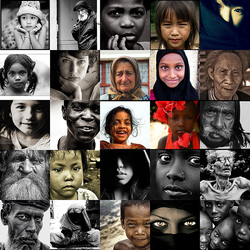What's Lost When A Language Dies

The living memory of World War II is not quite so close to extinction, but it, too, is slipping away. The youngest WWII veterans ... assuming an age of 17 at the end of the war ... are now 81. There might be one or two who slipped in younger, but if the living memory of the war were a language, it would be classified as "moribund," meaning it had only a few elderly speakers left, according to the UNESCO "Atlas of World Languages in Danger of Disappearing."
We feel the ache and pressure, as time grows short, to try to preserve as much of the wisdom and as many of the memories from those veterans as we can, sensing that when the last of them leave us, we will be bereft of something important; a part of our heritage, story and learning that will leave us the poorer for its loss. There's even a Veterans History Project, organized by the Library of Congress, that's trying to collect as many veterans' stories as possible before time runs out.
Our parents' and great-great-grandparents' memories, after all, tell us not only of the world before our time, but of who we are and where we came from. They give us our pride, our shame, our sense of grounding and roots, and a sense of continuity that is a unique part of our personal narrative and identity. But what about the language those ancestors spoke? Is that an important part of the picture, as well? And does it need to be kept "alive" in the same sense that we want their stories remembered and retold?
It's a relevant question, because experts expect 90% of the world's approximately 7,000 languages will become extinct in the next 100 years as cultures mesh and isolated tribes die out. And the answer may well depend on where you sit when you view the question.
Some in the linguistic community are responding to the accelerating pace of language loss by scrambling to create a language database similar to the Library of Congress's Veterans History Project. Fifty internationally-renowned linguists are gathering at the University of Utah this week to take the first steps in trying to catalogue some of the world's endangered, seriously endangered, or moribund languages before they become extinct. They hope that the databases they help to create (and help direct funding to support) will provide the equivalent of DNA material that can be used to reconstruct languages, with all their cultural clues and connections, even after the last person with a spoken knowledge of them dies.
"The wisdom of humanity is coded in language," says Lyle Campbell, director of the university's Center for American Indian Languages. "Once a language dies, the knowledge dies with it."
But not all linguists agree. In a recent World Affairs article, John McWhorter, a linguist and lecturer in the Department of English and Comparative Literature at Columbia University, asked "would it be inherently evil if there were not 6,000 spoken languages but one? We must consider the question in its pure, logical essence, apart from particular associations with English and its history."
McWhorter's argument, which is long, asserts that while the death of a language is an artistic loss, our attachment to diverse languages itself is a bit perverse, given that he believes they grew up as a function of diverse geographical dispersion of people. Language, he believes, is not inherently linked to culture. And that as a matter of practicality in an increasingly global world, the use and existence of fewer languages is not only less work, in terms of learning and maintenance, but actually an advantage.
More than one aspiring national government, especially in its nascent stages, would have agreed with McWhorter on that last point. But not because language is separate from culture. On the contrary, efforts to stamp out regional languages and instill one, unified national language are undertaken because language is so inextricable and central to culture. So just as regional or tribal languages are seen as a threat to national loyalty and identity, a national language doesn't just make trade and communication easier. It also helps build another, unified, "national" identity, instead.
Unfortunately, that strategy doesn't always work. Or, at least, not without a cost. Pamela Serota Cote, whose doctoral research at the University of San Francisco focused on Breton language and identity, argues that looking at language as only a practical tool or as an outside connaisseur, as McWhorter does, misses the central importance of language to personal narrative and identity.
 "We understand things, events, ourselves and others through a process of interpretation, which occurs in language," she argues. "The diversity of our languages represents the richness of our expressiveness of Being. This is how language, culture and identity intersect; it is also why the loss of a language is such a concern and why minority language rights is such an emotionally charged issue in countries around the world. Because language discloses cultural and historical meaning, the loss of language is a loss of that link to the past. Without a link to the past, people in a culture lose a sense of place, purpose and path; one must know where one came from to know where one is going. The loss of language undermines a people's sense of identity and belonging, which uproots the entire community in the end. Yes, they may become incorporated into the dominant language and culture that has subsumed them, but they have lost their heritage along the way."
"We understand things, events, ourselves and others through a process of interpretation, which occurs in language," she argues. "The diversity of our languages represents the richness of our expressiveness of Being. This is how language, culture and identity intersect; it is also why the loss of a language is such a concern and why minority language rights is such an emotionally charged issue in countries around the world. Because language discloses cultural and historical meaning, the loss of language is a loss of that link to the past. Without a link to the past, people in a culture lose a sense of place, purpose and path; one must know where one came from to know where one is going. The loss of language undermines a people's sense of identity and belonging, which uproots the entire community in the end. Yes, they may become incorporated into the dominant language and culture that has subsumed them, but they have lost their heritage along the way."If the last living members of a community or culture who speak a particular dialect or language die, there are no descendants to be uprooted, of course. And, perhaps, there is nothing to be done about that. Serota Cote acknowledges for a language to be revived, there has to be a population left to learn it, and a strong desire among the young people to revive that connection with their heritage.
But in Brittany, which was gathered into France only after the Revolution, the language became endangered not because of low population numbers, but because national edicts mandated that French be the only language spoken or learned. Finally, in the late 1970s, a movement sprung up to revive the Breton language, which bears far more resemblance to the tongue of Brittany's Celtic settlers than French. Language immersion schools now teach the language to children wishing to learn Breton as well as French, and other cultural revival efforts in Breton music and dance have accompanied the language movement.
The result has been remarkable, even though only a tiny percentage of Bretons actually go through the language schools. The Bretons have not revolted against French rule. But the shame at being Breton has receded, much as the African-American "Roots" movement reduced the shame at being black by offering a narrative story and pride that the children of subsumed slaves had lacked. A high rate of alcoholism and depression has receded and, as Serota Cote observed, "every Breton I spoke with who has learned the language as an adult said they feel now that they have been able to close the gap and heal those past wounds of shame. Many described finally discovering their roots by learning the language. One Breton said that the language 'completes the whole.'"
The challenge of melding and balancing past and present; tribal roots and unified national identity is one many nations struggle with. Too much tribal loyalty can breed division, but too much focus on an unified whole can destroy not only colors in the cultural fabric of a country, but an important sense of identity and narrative continuity among its diverse citizens. And language, like family or cultural memories, can play an important role in that narrative.
Sometimes language dies because an entire population dies out. That's still a loss, just as every plant and animal that becomes extinct is a loss to the richness of the planet's tapestry of existence. But in cases where the language wanes not because of physical extinction, but because of cultural subsumption, the loss of a language is a far more personal tragedy ... at least to those within that culture. For someone inside a lost or dying culture, a language can be like the memories of our grandparents--not required, or even convenient, for efficiency of operation in a modern, globalized world, but essential for our sense of roots, security, identity, pride, continuity and wholeness.
Life moves on. World War I is a distant memory, even for the elderly. Many Americans don't even know the real origins of "Veteran's Day." But imagine, for a moment, if we'd lost more than just the memory of the day's origins. Imagine if, along with losing those who remembered the world when Armistice Day was first celebrated, or even what the experience of WWII meant, we were also losing the language through which those memories had been lived and recorded. Chances are that any arguments about the accidental origins of that language, or its obscure use in the commercial world, would suddenly seem far less important to us than keeping that link with our heritage and past alive. No matter what anyone on the outside thought.
(Photos: Kevin/Flickr and pardeshi/Flickr)
(Photos: Kevin/Flickr and pardeshi/Flickr)
Lane Wallace is a pilot and adventure writer. She is the author of Surviving Uncertainty: Taking a Hero's Journey.